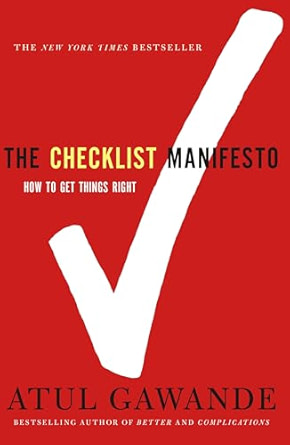
In The Checklist Manifesto , Dr. Atul Gawande reveals how a simple tool—the checklist—can prevent costly mistakes in complex fields like surgery, aviation, and construction. By ensuring that nothing is overlooked, checklists improve teamwork, reduce errors, and save lives. This book proves that sometimes, the smartest solutions are the simplest.
In The Checklist Manifesto: How to Get Things Right , surgeon and writer Dr. Atul Gawande makes a compelling case for the surprising power of one of the simplest tools we have: the checklist .
Gawande, a practicing surgeon and public health researcher, explores how modern problems—especially in complex fields like medicine, construction, and aviation—are no longer solved by knowledge alone. Instead, the challenge lies in making sure we consistently apply what we already know . This is where checklists come in.
Drawing from real-life examples, Gawande shows how even highly trained professionals make preventable mistakes due to the sheer complexity of their work. He recounts stories of surgical errors, building collapses, and aviation disasters—all of which could have been avoided with better systems of coordination and simple reminders.
One of the most impactful parts of the book is his account of how he helped design the WHO Surgical Safety Checklist , a tool that dramatically reduced complications and deaths in operating rooms around the world. The results were staggering: hospitals using the checklist saw major drops in infections, surgical errors, and patient deaths—just by ensuring that basic steps weren’t missed.
Gawande explains that checklists are not about treating professionals like robots—they’re about supporting human memory and judgment under pressure . They help teams avoid “stupid” mistakes that result from distraction, fatigue, or overconfidence.
He also highlights how industries like aviation and construction use checklists as standard practice. Pilots go through pre-flight checklists every time they fly—even though they’ve done it hundreds of times. Similarly, skyscrapers are built using detailed checklists to ensure safety and quality at every stage.
Throughout the book, Gawande challenges the notion that expertise alone is enough. He argues that humility, discipline, and teamwork—supported by good tools like checklists—are essential for success in today’s complex world.
The Checklist Manifesto is especially valuable for professionals in healthcare, business, project management, education, and anyone interested in improving performance and reducing errors in high-stakes environments.
It’s a short but powerful read that will change how you think about simplicity, systems, and success—not just in your work, but in life.